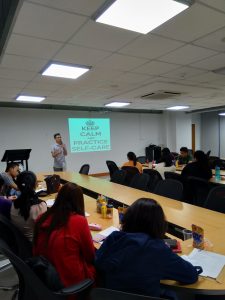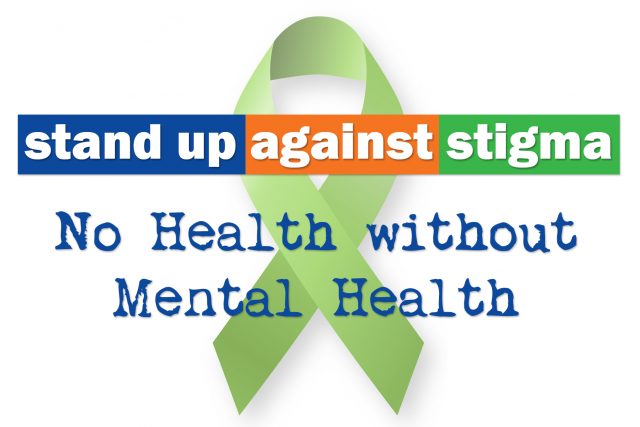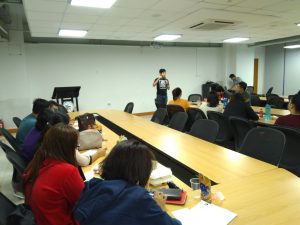The Centre of Psychological Extension and Research Services, or more commonly known as COPERS, held its 3rd round of Mental Health Awareness (MHA) Seminar-Workshop at Ateneo de Davao University on April 28, 2018. Professionals and practitioners from different institutions all over Davao City attended this seminar-workshop. COPERS is the community engagement arm of the Psychology Department of the said university.
Mental Health is part of the holistic health of a person. With this, it is a priority for us to be aware of the implications of taking care of our mental health.
The MHA seminar-workshop included three sessions, namely: Mental Health First Aid, Crisis Intervention, and Psychological First Aid.
The morning session was about Mental Health First Aid which was given by Mr. Gabriel Sebastian N. Lizada. According to him, everyone is susceptible to mental health concerns. Our mental health depends on our current situation and how we deal with it. He discussed the mental health continuum which pointed out the prevention, early intervention, and the recovery stage of a person.
With all the possible events that could impact the mental health of an individual, acceptance of one’s situation increases one’s psychological flexibility. It is not just merely learning to live with the problem but also accepting that you are aware of what you are going through. Acceptance opens the path to recovery.
Mr Lizada also led the participants into a mindfulness activity wherein awareness is channeled from one’s body. As the eyes were kept closed, Mr Lizada facilitated the flow of awareness as the participants listened to his instructions. Since Mr Lizada is also a positive psychology enthusiast, he gave the participants an assignment of noting down three things that make them happy every day for seven days.
Mr Randolph Reserva, a COPERS affiliate, gave the second session. His talk was about Crisis Intervention. Concepts about stress and resilience were introduced and refreshed together with the attendees. In his talk, Mr Reserva bespoke of stress and its adjacent concepts which are Eustress, Distress, and Dysfunction. Stress is needed for us to be driven to move. However, too much stress which runs in the long term is a predicament for it harms an individual’s health. 
A person has his/her own emotional equilibrium. Too much stress for a long period upsets this balance within a person and renders him/her under a state of crisis. People in crisis are never to be underestimated, as well as the gravity of their situation.
“We just need more good people to help us in times of trial.” Said Mr. Reserva. Anyone with listening ears and understanding disposition can help people under crisis cope through.
Mr Rogelio Lelis Jr. gave the last talk. The session was all about Psychological First Aid (PFA). Mr Lelis started the discussion by asking the participants what attributes does a psychologically healthy person possesses. Answers ranged from being resilient, having clear cognitive efficiency, to being responsive and knowing how to manage and utilize knowledge.
In this session, a workshop was also done. The participants were grouped, and each group was given actual problems in communities, and they were tasked to think of reactions and primary treatments for those problems.
Starting off from those points, Mr Lelis discussed his experience and of his colleagues’ experiences in helping communities. One cannot just intervene without knowing the culture of the community that is being supported. People of different communities have their distinct ways of coping in response to the problems their community faces. We have to understand their plight first before sending out all of our charities to better answer what they are actually asking for.
Psychological first aid can be used as a needs assessment. PFA is also not a professional counselling so anyone who is willing to be trained and willing to harness the needed qualities to support a person would be apt to help. As Mr. Lelis presented, a person who is able to apply SCCHS can do PFA. SCCHS stands for Safe, Connected, Calm, Hope, and Self-Efficacy. Working with these concepts assist a person in giving PFA.
Our mental health is as important as our physical, emotional, and spiritual health. We cannot downplay one over the others. A holistic growth will not be made possible if our mental health is crippled and at risk.
As Mr Reserva said, “We just need more good people to help us in times of trial.” Indeed, more than the outside uncontrollable factors that interplay our lives, what we can control and take care the most is our very own mental health. Knowing oneself first becomes the gateway to helping others. Being aware of mental health, what it is about, and what it entails brings a radical approach in helping others protect, preserve, and cope with their own mental health.









